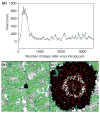Agent-based models in translational systems biology
- PMID: 20835989
- PMCID: PMC3640333
- DOI: 10.1002/wsbm.45
Agent-based models in translational systems biology
Abstract
Effective translational methodologies for knowledge representation are needed in order to make strides against the constellation of diseases that affect the world today. These diseases are defined by their mechanistic complexity, redundancy, and nonlinearity. Translational systems biology aims to harness the power of computational simulation to streamline drug/device design, simulate clinical trials, and eventually to predict the effects of drugs on individuals. The ability of agent-based modeling to encompass multiple scales of biological process as well as spatial considerations, coupled with an intuitive modeling paradigm, suggests that this modeling framework is well suited for translational systems biology. This review describes agent-based modeling and gives examples of its translational applications in the context of acute inflammation and wound healing.
Figures




References
-
- An G. Concepts for developing a collaborative in silico model of the acute inflammatory response using agent-based modeling. J Crit Care. 2006;21:105–110. discussion 110–101. - PubMed
-
- Abbott R. The reductionist blind spot. Complexity. 2009;14:5, 10–22.
Publication types
MeSH terms
Grants and funding
LinkOut - more resources
Full Text Sources
Other Literature Sources

